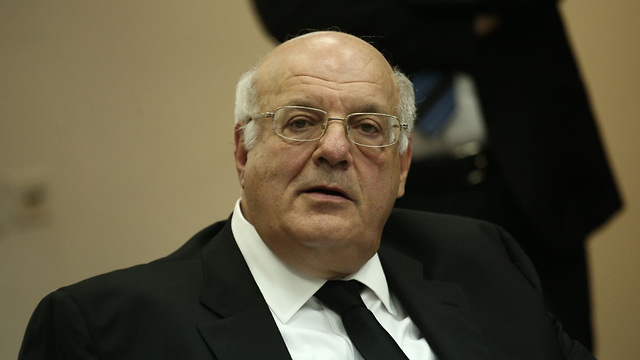
Tourism Minister Levin (L) and Justice Minister Shaked
Photo: Alex Kolomoisky, Ido Erez

Shaked, Levin promote privately-sponsored 'job bill'
Justice Minister Shaked, Tourism Minister Levin announce intentions to circumvent High Court's interim injunction of implementation of law allowing ministers to appoint deputy directors-general without tenders by promoting private bill on matter; decision reached despite meeting on issue between Chief Justice Hayut, PM Netanyahu.
In an irregular, unprecedented move, Justice Minister Ayelet Shaked and Tourism Minister Yariv Levin announced Sunday they will be promoting a privately-sponsored bill to allow
ministers to appoint deputy directors-general for government ministries without tenders.



The decision flaunts a High Court of Justice ruling on the matter, which issued an interim injunction against implementing the governmental decision on the issue.
The so-called "job law" was passed as a government decision more than six months ago, despite the reserved opinion of Attorney General Avichai Mandelblit.

Justice Minister Shaked (L) and Tourism Minister Levin have decided to promote a privately-sponsored 'jobs bill' (Photo: Avi Hai)
The decision, which was met with scathing public criticism, allowed ministers to appoint deputy directors-general at their ministries without having to issue tenders. The decision also sought to change the composition of search committees for civil service positions.
According to ministers Levin and Shaked, the decision was intended to shore up the principle of governability.
Due to the inherent fear of corruption seeping into the system with tender-free appointments, however, the High Court issued its injunction, which effectively postponed the government's ability to implement the decision—causing multiple appointments to be jammed, or halted from commencing.
On the backdrop of the matter, Shaked and Levin alleged that the court caused foot-dragging that brought most candidates for the deputy director-general position to withdraw their candidacy, as they could not tell when and how the court will eventually rule.
"The matter left the ministers with no other recourse and therefore it is their intention to support the bill to endow ministers with the authority to appointed deputy directors-general as they appoint the directors-general themselves," a statement put out on behalf of the two ministers said.
Choosing to pass the law as a privately-sponsored one was intended to circumvent the High Court's ruling, a decision that serves as direct continuation of the power struggles between the court and government surrounding the override power.

Chief Justice Hayut (L) and PM Netanyahu convened to discuss the override power Sunday (Photo: Reuters, High Court's website)
On the same matter, Supreme Court Chief Justice Esther Hayut and Prime Minister Benjamin Netanyahu convened Sunday to discuss the legislative initiative to enact the override power, allowing the government to pass Knesset laws struck down by the court.
The meeting, held at Prime Minister Netanyahu's behest, was also attended by Justice Minister Shaked and Deputy Chief Justice Hanan Melcer. The meeting was intended to settle the dispute surrounding the override power.
According to the Prime Minister's Office "the different positions were heard, and there was an in-depth and serious discussion."
Despite the meeting with Hayut, Shaked, who is promoting the controversial bill together with Minister Naftali Bennett, still intends to bring the bill proposal to a vote at the Ministerial Committee for Legislation next Sunday.
While Chief Justice Hayut has yet to make any public comments on the different bills, it was reported she and Deputy Chief Justice Melcer debunked a commonly held myth as to the extent of the court's interference with the Knesset's work.

Deputy Chief Justice Melcer and Hayut made efforts to debunk the myth of judicial intervention in Knesset decisions (Photo: Hillel Meir/TPS)
The most important piece of evidence to prove the myth's falsehood is that since the onset of the Judicial Revolution in the early 1990s, when the High Court began reviewing Knesset laws, only 18 pieces of legislation were struck down by the court.
In a prior speech before a legal forum, Hayut clarified that, "The court does its best to exhaust every possible avenue to make a judicial decision by the High Court unnecessary. However, such a solution may not always be brokered, and in those instances a judicial decision is indeed warranted."
As far as judicial review was concerned, Hayut stressed that it had nothing to do with power struggles, but fulfilling the court's role of upholding the rule of law and preserving fundamental constitutional values and human rights.
In her various speeches on the matter, the chief justice swatted away a claim often made about the court's rulings, according to which the High Court was overly active in interfering with government decisions to a point where "governability" was compromised.
Rebutting the allegation, Hayut mentioned on numerous occasions that public officials intentionally refrain from making decisions themselves—especially on sensitive issues—and prefer to let the matter reach the court.















